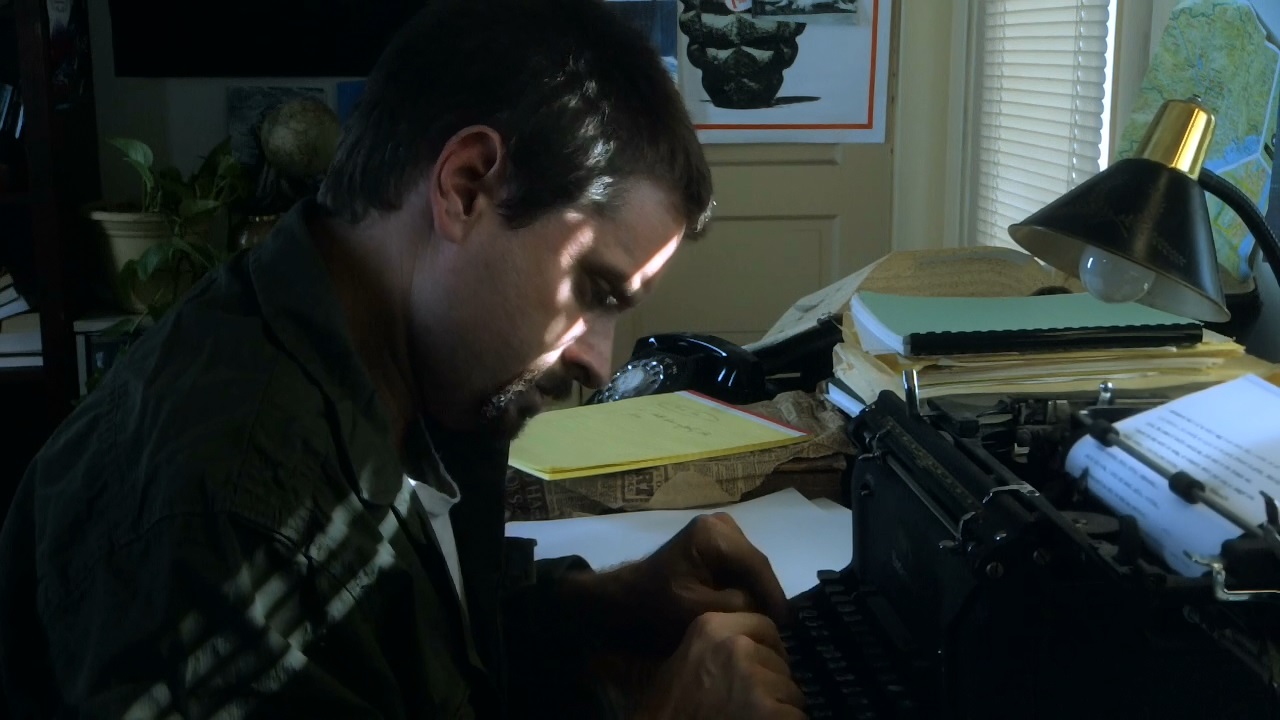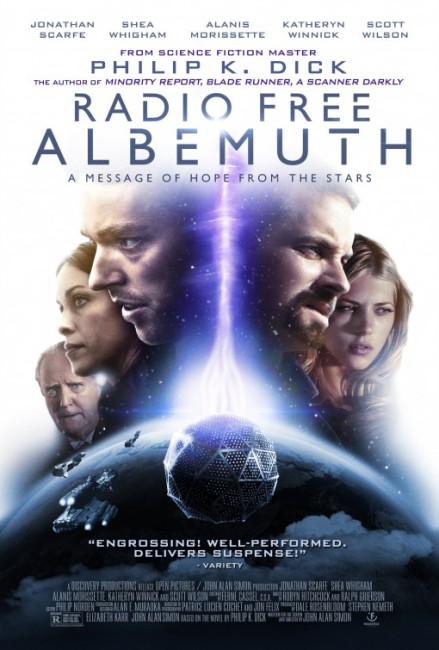USA. 2014.
Crew
Director/Screenplay – John Alan Simon, Based on the Novel by Philip K. Dick, Producers – Dale Rosenbloom, Elizabeth Karr, Stephen Nemeth & John Alan Simon, Photography – Patrice Lucien Cochet & Jon Felix, Music – Ralph Grierson & Robyn Hitchcock, CGI – Angst Group LLC (Yas Koyama, Ergin Kuke & Klaus Seitschek), Production Design – Alan E. Muraoka. Production Company – Open Pictures/Discovery Productions.
Cast
Jonathan Scarfe (Nick Brady), Shea Whigham (Phil), Alanis Morissette (Sylvia Aramchek Sadassa), Katheryn Winnick (Rachel Brady), Hanna Hall (Vivian Kaplan), Scott Wilson (President Fremont), Will Rothhaar (Ted Pollett), Joseph D. Reitman (Prisoner #1)
Plot
In Berkeley, record store clerk Nick Brady keeps waking in the early hours of the morning having intense dreams and visions. He tells his best friend, the science-fiction writer Phil, that he believes these are coming from an entity he calls VALIS (Vast Alien Living Intelligence System). From VALIS, Nick receives instructions that start coming true, including it suggesting that he and his wife move to Los Angeles where he is able to get a job as an executive at Progressive Records. In trying to understand and explain the visions, Nick comes up with many theories ranging from messages from an alternate timeline to an orbiting alien satellite that has been there for thousands of years guiding humanity to hallucinations caused by toxins from an infected tooth. Nick realises that he has been directed by VALIS to stand up against the totalitarian government of President Fremont. Fremont has been in power for sixteen years and is creating a crackdown on a terrorist group of former Soviet agents that call themselves Aramchek. Nick then meets Sylvia Sadassa, whose birth name is Aramchek, a girl he saw singing in a dream, who comes asking for a job as a secretary. Drawn together with Sylvia, he discovers she is a fellow VALIS contactee and a member of Aramchek. He is drawn into a VALIS-led plot to ferment rebellion against President Fremont using subliminal messages hidden inside a hit song that he is required to produce. However, Fremont’s security forces are making enquiries into their lives and are determined to stop them.
Philip K. Dick is a science-fiction writer whose works have gained a cult following. Between 1952 and his death in 1982, Dick wrote numerous novels and short stories. These include works such as The Man in the High Castle (1962), Martian Time-Slip (1964), The Three Stigmata of Palmer Eldritch (1964), Do Androids Dream of Electric Sheep? (1968), Ubik (1969), A Maze of Death (1970) and Flow My Tears, The Policeman Said (1974). Almost all of Philip K. Dick’s work tends to centre around paranoia and questions of reality. Protagonists in Dick stories are constantly finding that their world is an artificial construct or that someone is manipulating their perception. Dick has become one science-fiction writer more than any other whose work has been readily adapted to the screen, the first of which was the cult hit of Blade Runner (1982), which ironically only came out just after Dick’s death. (A full list of films adapted from Dick’s works is at the bottom of the page).
With a number of bad adaptations of his books, the Dick estate has been more selective over who they give film rights to in recent years. Radio Free Albemuth was a long, legendary Philip K. Dick adaptation. In the early 2000s, Discovery Films acquired the rights to the Dick novels Flow My Tears, the Policeman Said, VALIS and Radio Free Albemuth (1985). Discovery head John Alan Simon had previously worked as a film critic, publicist and lecturer in film studies. He had minor credits on films, including as a producer of The Getaway (1994), but had not directed before. Simon raised backing and began filming Radio Free Albemuth on a low-budget in 2007 for a release in 2010. However, funding collapsed and Simon was unable to finish shooting or complete post-production. A partially completed cut of the film was shown at various film festivals and conventions throughout 2010 and 2011. Simon sat on the print for a few years until interest pushed him to begin a Kickstarter campaign to get the funds to complete it. The complete version of the film only appeared in 2014 with minor theatrical screenings before going to VOD and dvd.

In order to understand Radio Free Albemuth, one first needs to understand a good part of Philip K. Dick’s exceedingly strange life. For a period of time in 1974, Dick experienced intense dreams and visions of a pink light that seemed to grant him insights into things he could not possibly know such as giving him very specific diagnoses as to how his young son was ill. These visions continued for two months in which Dick believed he was being contacted by God or an alien entity and at other times he was a martyr in the First Century A.D. and everything about the modern day was an illusion. More credible speculation puts this down to an impacted wisdom tooth and/or reactions to a dental anaesthetic.
In an attempt to rationally understand what was happening, Dick wrote the experience into a work of fiction, which was originally entitled VALIS. This was completed in 1976 but publishers demanded extensive rewrites and Dick declined to do so. He instead rewrote the ideas with less autobiographical detail into what he intended to be a trilogy with VALIS (1981), followed by The Divine Invasion (1981) and The Owl in Daylight, the latter remaining an uncompleted manuscript when he died in 1982 (much speculation exists as to what this consists of). The original manuscript was only posthumously published for the first time in 1985 where it was retitled Radio Free Albemuth to avoid confusion with VALIS.
Radio Free Albemuth incorporates much of the autobiographical material that took place during the pink light incident – Dick’s apparent knowledge about matters he could not know such as his son’s illness; the visit from a delivery girl wearing a Christian ichthys pendant, which became of great symbolic significance to Dick; Dick’s dislike of then President Richard Nixon and his paranoia about radicals (incarnated here in the totalitarian control of President Fremont); the incident whereby Dick’s safe was mysteriously blown up in 1971; many of the wild speculations and theories that Dick developed about what was happening to him. The film takes it even closer and has the character played by Shea Whigham be Dick in all but last name – Whigham is constantly referring to works of his, which are all books that Dick wrote – The World That Jones Made (1954), The Three Stigmata of Palmer Eldritch and Flow My Tears, The Policeman Said, while he also describes the premise of The Man in the High Castle as the book he is currently working on at one point.

Radio Free Albemuth is B-budget Philip K. Dick. That is probably a good thing. This makes it a film made by Dick aficionados as opposed to a Dick property that has been through the Hollywood studio wringer and been turned into something unrecognisable. Thus it is a Dick film that pays close respect to the source material and faithfully adapts it, whereas many of the other adaptations have tended to conceptually strip them down and turn them into action films. As a result, this a film that mainlines the mind-bending conceptual glory of Dick’s work – paranoia, alternate realities, imagined worlds, subliminal messages, multiple interpretations of the phenomena all of which could be equally valid, the hero thinking he is in communication with insurgent groups and receiving messages from aliens. Not to mention that the film manages to make Dick’s anti-Nixonian paranoia about the police and surveillance state even more relevant for the George W. Bush/Obama era than when Dick wrote the book.
The CGI representing VALIS and Jonathan Scarfe’s visions are on the lesser budgeted side but are perfectly acceptable in that this is not an effects driven film. Shea Whigham never makes for that convincing a Dick – he gives the impression more of an average joe who would be more at home on a construction site than mulling upon the nature of reality. One surprise is singer Alanis Morissette. Morissette had only played before in Kevin Smith’s Dogma (1999) as no less than God, as well as parts in episodes of Nip/Tuck (2003-10) and Weeds (2005-12), which were actually aired after she appeared here. She holds up fairly well in what is essentially only her second acting role.
Other Philip K. Dick adaptations are:- Blade Runner (1982), Total Recall (1990), Screamers (1995), Impostor (2002), Minority Report (2002), Paycheck (2003), A Scanner Darkly (2006), Next (2007), The Adjustment Bureau (2011), Total Recall (2012)the tv series adaptation of The Man in the High Castle (2015-9) and the tv anthology series Philip K. Dick’s Electric Dreams (2017-8). The Gospel According to Philip K. Dick (2000) is a fascinating documentary about Dick’s bizarre life.
(Nominee for Best Adapted Screenplay at this site’s Best of 2014 Awards).


